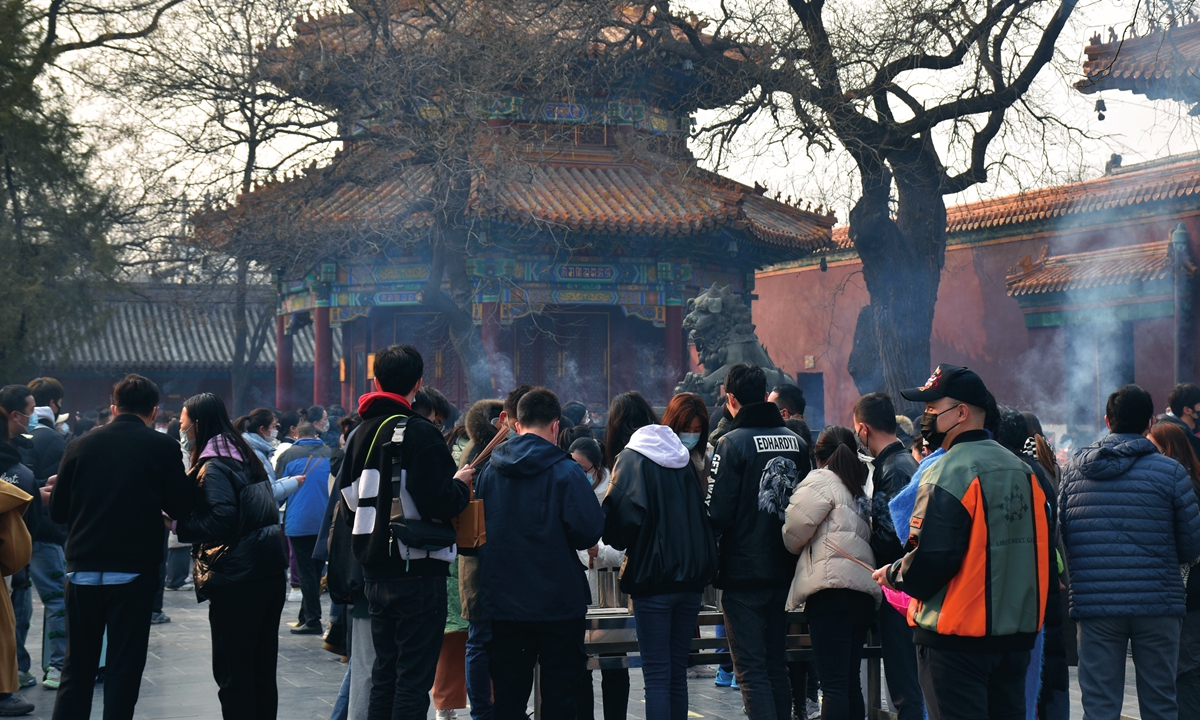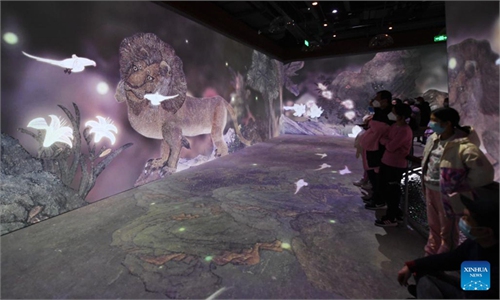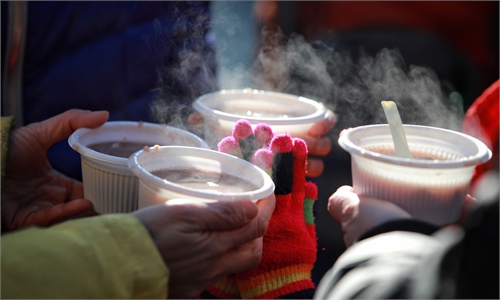
Tens of thousands of pilgrims line up to pray for the good luck at Yonghe Lama Temple in Beijing on February 26, 2023.Photo: IC
Temples in China, which used to be the realm of the silver-haired, have been receiving more and more visitors from the younger generations - young people take pictures in smoky temple yards and share them on social media, buy Buddhism-themed souvenirs and offer incense and tributes as well as make wishes.
But after talking with young temple goers, the Global Times found the new trend is not about Buddhist beliefs, but driven by mixed motivations.
A new fashion
Data from the travel platform Trip.com shows that bookings for temples as of February 21 in 2023 increased 310 percent from the same period in 2022. In February, nearly half of the people who booked tickets for temples on the platform are post-90s or even post-00s.
Search indexes are telling more as "temples" were searched 586 percent more frequently from January 1 to March 16 than the previous year. Roughly 44.9 percent of people who make such searches are aged between 18 and 30, according to Ocean Engine, a digital marketing servicer.
Shen Yuning, 28, who has been visiting the Yonghe Lama Temple (Yonghegong) in Beijing routinely, used to be one of the very few young faces in this famous Tibetan Buddhism venue. But when she went to the temple in February 2023, most of the visitors are young and "I can tell many are much younger than me, seemingly college students or workplace newcomers."
The most popular Buddhas among young visitors are those in charge of careers and fortunes, while the one in charge of romance and marriage is receiving less interest than before, Shen noted those interesting changes.
In Hangzhou, East China's Zhejiang Province, young people line up outside the Lingyin Temple as early as 7 am in the morning to "offer the first incense" which, according to customs, would be the most efficacious.
The Global Times talked with a handful of young temple goers on Weibo and the lifestyle-sharing app Xiaohongshu, finding none of them are Buddhist believers and most of them do not have a strong, specific wish they hope to realize.
For some, visiting a temple, offering incense, and sharing photos online are very much a new trend that young people feel compelled to catch, just like suburb camping and Frisbee which went highly popular in 2022.
Generation Z is reluctant to follow others and seeks to demonstrate their uniqueness, such mentality prompts them to seek niche leisure activities, which exactly drove the sudden popularity of some non-stream hobbies, Zhang Yiwu, a Chinese language professor at Peking University, told the Global Times.
When temple visitors share photos and stories of "efficacious temples," other young people, most heavy users of social network apps, are likely to be influenced, get intrigued and join the group, Zhang said.
Temples offer more
Temples now also have more to offer, from coffee and vegan meals to blessed jewels and "blessing services."
Xiaohongshu user Huini went to Yongfu Temple in Hangzhou during the Spring Festival, where she had a try at the temple coffee and noodles.
"The taste [of the coffee] was not bad. Yet it was more about experience…Try something very 'young' and 'Western' at a Chinese Buddhist temple dating back to 1,600 years ago, an interesting contrast," Huini told the Global Times.
Huini shared the experience online, which became one of her posts that were liked most times.
Yongfu Temple is not alone, as the Global Times found many temples offer coffee, bubble tea, and snacks. The food and drinks usually have a name related to Buddhist stories. Young people are also buying out temple souvenirs. Shen Yuning presented an incense ash bracelet she bought at Yonghegong, which was advertised to be made from incense ash from the temple. Shen recalled that lines outside the temple stores were the longest, much longer than those in front of temple halls.
On Xiaohongshu, posts instructing visitors to get a bracelet carrying "good meanings and blessings" are countless. Many people, therefore, chose to visit the temple to ask for "tailored" blessings, for a job promotion or good scores, at the religious object consecration centers. The demand of people outside Beijing even sustained many buying agents.
Exit of pressure
The hustle and bustle of those consecration centers also tell about what young people cared about - people bring their personal belongings to be blessed by a Buddhist master, including things as odd as hard drives and laptops.
"Should I walk into a temple with my left leg or right one?" The question might be a joke, but it demonstrates a number of young people are very serious about visiting temples and making wishes.
Tips are shared online to teach beginners about how to offer incense and other tributes, the correct gesture and words to make a wish, including whether it is necessary to recite one's ID number in front of the Buddha.
Zhang Yiwu noted that Chinese people have a very pragmatic perception of all religions - hope they can help with their secular life. From wishes before the Buddhas to blessings carried by bracelets and those odd personal objects, young people have very realistic goals in mind.
A viral sentence goes "Between going to work and going to study, young people choose to go to temples." But young people are actually thinking about their work and study, rather than lying flat and wanting nothing, Zhang said. He saw the phenomenon to be combining Chinese pragmatic perception of religion and efforts in pursuit of a better life.
Shen said visiting temples is also a method to get some mental relief when one gets too stressed. "Wishing for a promotion does not mean I do not work hard but only sit there and wait for the good luck."
In one word, no single word can describe Chinese youth as they are growing up in a time of fast and vast changes. They are diverse and lively, have an open mind for new, trendy things and cope with pressure in their own ways, Zhang said.


